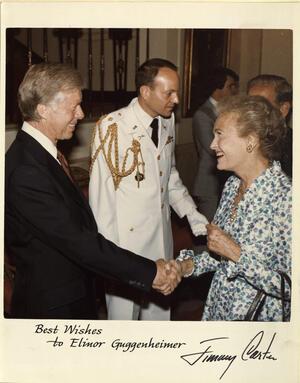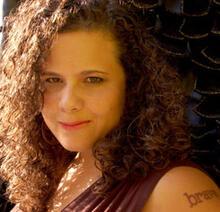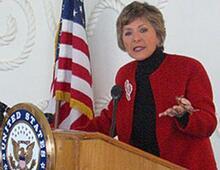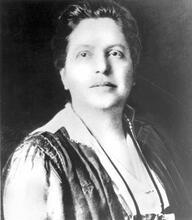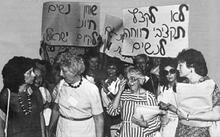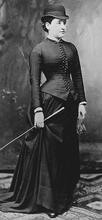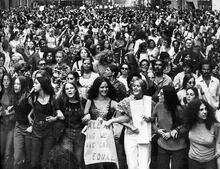Elinor Guggenheimer
Elinor Guggenheimer focused her career in city government on higher standards for childcare and on greater representation of women in politics. After WWII, she led efforts to save over 90 day care centers and improve their quality of care. In 1948 she became founding executive director of the Day Care Council of New York. After running for city council president, and determined to help other women win elections and serve their constituents effectively, she helped found the Women’s Political Caucus in 1971 with Bella Abzug, Shirley Chisolm, and others. In 1973 she also founded the Women’s Forum, meant as a network for women leaders in various professions. Guggenheimer wrote books on urban planning and social entertaining, and her musical, Potholes, enjoyed a short off-Broadway run in 1979.
Elinor Guggenheimer first toured New York City day nurseries as a member of the Federation of Jewish Philanthropies during the 1930s. Horrified by what she saw, Guggenheimer began a lifelong crusade for improved and standardized child care facilities across the country. A veteran of New York City politics, Guggenheimer also worked to promote women in public office and was one of the founding members of the Women’s Political Caucus in 1971.
Early Life & Career
Elinor (Coleman) Guggenheimer was born on April 11, 1912, the only child of Nathan Coleman, a commercial banker, and Lillian (Fox) Coleman. After growing up in New York City, she attended Vassar College until 1931. The following year, she married Randolph Guggenheimer, with whom she later had two sons. Guggenheimer earned her B.A. from Barnard in 1934 and worked for a short time as a documentary filmmaker. During the late 1930s and 1940s, she was active in numerous Jewish organizations, including the Young Women’s Hebrew Association, the Jewish Association of Neighborhood Centers, and the Educational Alliance.
Work for Public Day Care
Following World War II, Guggenheimer spearheaded a successful effort to save over 90 public day nurseries that had opened during the war. She worked to keep public attention focused on child care issues and, in 1948, founded the Day Care Council of New York, serving as its executive director throughout the 1950s. In 1958, she also established the Intercity Day Care Council, a national child care advocacy organization.
Political Career & Advocacy
Guggenheimer entered city politics in 1960 when she became the first woman elected to the New York City Planning Commission. Work with the Planning Commission occupied Guggenheimer until 1968. The following year, she ran as a Democratic candidate for city council president. The only female candidate in a field with 21 men, Guggenheimer campaigned to prove that women could run for political office. By 1974, she was appointed commissioner of New York City consumer affairs, a post that she held until 1978.
Frustrated by the scant representation of women in politics during the 1960s and 1970s, Guggenheimer cofounded the Women’s Political Caucus in 1971. With such leaders as Bella Abzug and Shirley Chisholm, the organization sought to provide nonpartisan support for women running for elected office. In 1973, Guggenheimer founded the Women’s Forum. A local initiative designed to provide a support network for elite women in various professions, the Women’s Forum went national in 1980. It is now an international organization based in Washington, D.C.
During the 1980s, Guggenheimer returned to the issue of child care and established the Child Care Action Campaign to lobby for the creation of a national day care program that would provide standardized and adequate child care for all children, despite economic status. She remained interested in building coalitions of professional women and, in 1992, founded the New York Women’s Agenda
Legacy
Guggenheimer was involved with numerous other political and social service organizations, including the Council of Senior Centers and Services. She lectured at the Center for New York City Affairs at the New School for Social Research from 1965 to 1976 and co-moderated Straight Talk, a daily one-hour public affairs television program, in the early 1970s. Her musical Potholes, a political satire, was produced in 1979 in an Off-Broadway theater.
One of a handful of women in elected office during the mid-twentieth century, Elinor Guggenheimer forged new paths for women in politics. She led the fight for a national system of day care in the United States and continued to work to increase the number of women in politics and the professions.
Elinor Guggenheimer died on September 27, 2008.
Berry, Mary Frances. The Politics of Parenthood: Child Care, Women’s Rights, and the Myth of the Good Mother. New York: Viking, 1993.
Guggenheimer, Elinor C. Planning for Parks and Recreation Needs in Urban Areas. Woodbridge: Twayne Publishers, 1969.
Hartmann, Susan. From Margin to Mainstream: American Women and Politics Since 1960. Philadelphia: Temple University Press, 1989.
Who’s Who in America. New Providence: Marquis Who’s Who, 1996.

